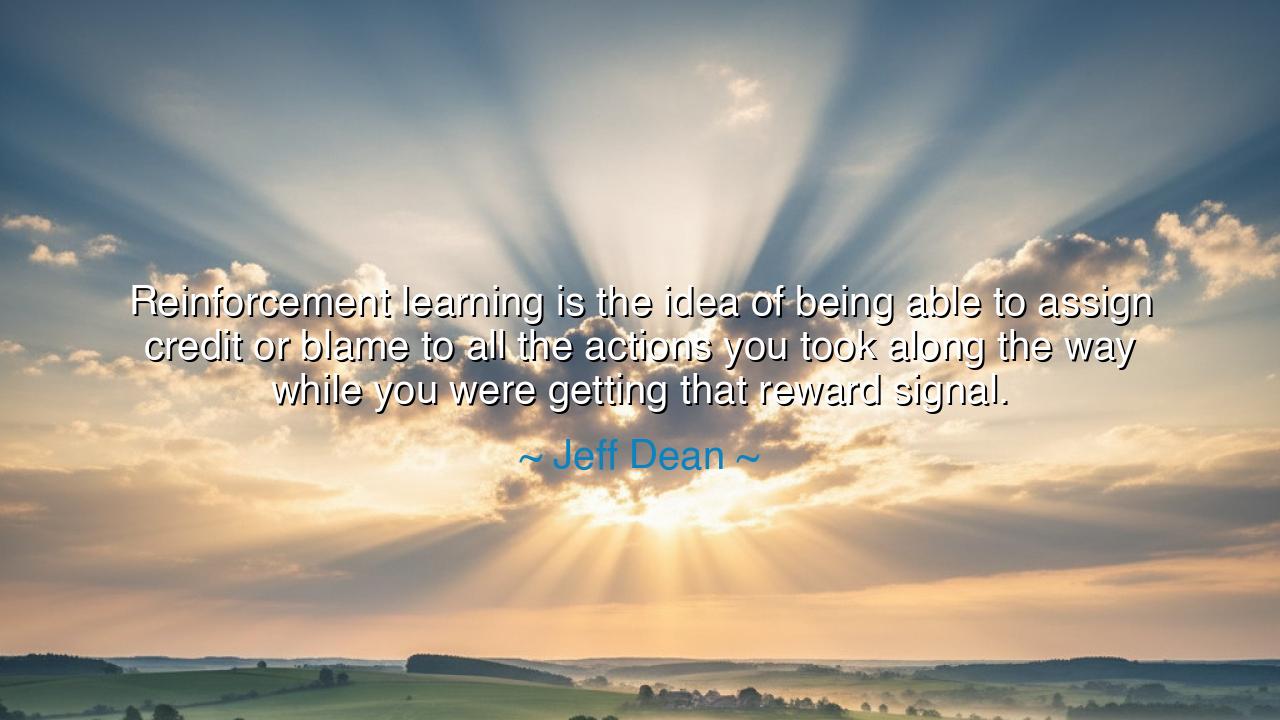
Reinforcement learning is the idea of being able to assign credit
Reinforcement learning is the idea of being able to assign credit or blame to all the actions you took along the way while you were getting that reward signal.






In the words of Jeff Dean, one of the great architects of the digital age, there lies a truth that transcends technology itself: “Reinforcement learning is the idea of being able to assign credit or blame to all the actions you took along the way while you were getting that reward signal.” Though he speaks of machines, he touches upon the very essence of human growth — the eternal law of cause and consequence, of learning through feedback, of becoming wise through trial and reflection. His insight is both scientific and spiritual, for it mirrors the path by which all beings, from the simplest life forms to the most self-aware minds, evolve toward understanding.
In the realm of artificial intelligence, reinforcement learning is the process by which a system learns from experience. It takes action, observes the results, and adjusts its behavior based on whether it moves closer to a desired outcome — the reward signal. Yet what makes this principle profound is not merely its technical brilliance, but its philosophical echo. For life itself is a vast reinforcement loop: every choice we make, every success or failure we encounter, carries within it a lesson — a signal of what leads us nearer or farther from truth, virtue, and fulfillment. To assign credit or blame rightly is to understand not only the result, but the path that led to it.
This is the wisdom of the ancients reborn in the language of code. The philosophers of Greece, India, and China all taught that awareness of one’s actions — and the effects they leave upon the soul and the world — is the foundation of growth. The Buddha spoke of karma, the accumulation of cause and effect that shapes the destiny of beings. Aristotle, in his Ethics, taught that virtue is formed not in single acts but through habit — through the constant calibration of behavior in pursuit of the good. Both understood, as Jeff Dean reminds us, that the secret to wisdom lies not in avoiding error, but in learning from it.
A fitting story of this truth can be found in the life of Thomas Edison, who failed hundreds of times in his quest to create the electric light. When asked about his failures, he replied, “I have not failed. I’ve just found 10,000 ways that won’t work.” Like the great algorithms of today, he was running his own experiment in reinforcement learning — assigning credit to what worked, blame to what did not, and refining his path with each iteration. His reward signal was not immediate success, but the illumination of understanding. Each mistake carried the light of revelation, until at last, he brought light to the world itself.
To assign credit or blame properly requires humility and reflection. It means recognizing that the outcomes of our lives are not born of one single act, but of many small decisions intertwined. Too often, people celebrate success without remembering the chain of disciplined efforts that led there, or condemn themselves for failure without seeing the courage it took to try. But to think like the wise — or like a great learner, human or machine — is to trace the thread backward, to see how each choice shaped the whole, and to use that knowledge to act more skillfully next time. This is how intelligence becomes wisdom, and how repetition becomes mastery.
In this way, Jeff Dean’s teaching reminds us that both man and machine must learn through cycles of trial, reflection, and adaptation. The reward signal is not merely the pleasure of success, but the clarity that follows understanding. To live well is to live as a learner — not fearing error, but refining one’s judgment through it. Whether in science, art, or daily life, progress depends upon our willingness to measure, to reflect, and to change. The stagnant soul, like the static program, soon becomes obsolete; the living soul, like a learning system, grows through feedback and failure.
Let this be the lesson for all who seek mastery, whether of craft or of character: do not run from your mistakes — study them. Do not chase only the reward — learn from the path that led to it. The wise know that each failure carries hidden credit, and each triumph carries hidden blame, for both reveal something about the self. To learn is to assign meaning to experience, and to assign meaning is to grow. Thus, the true art of reinforcement learning — in life and in mind — is not simply to win, but to awaken. And the one who learns from every signal, in time, becomes the master not only of machines, but of the spirit itself.






AAdministratorAdministrator
Welcome, honored guests. Please leave a comment, we will respond soon